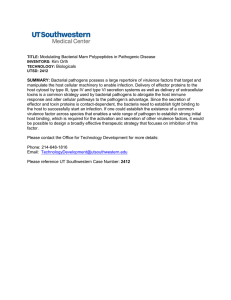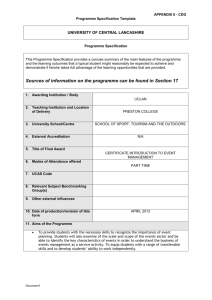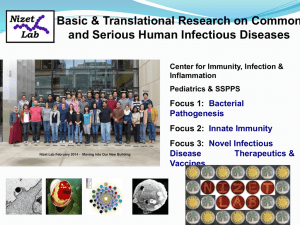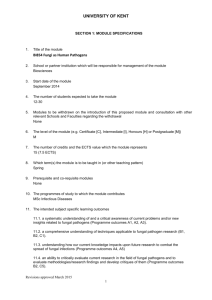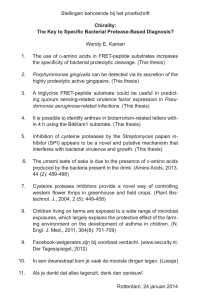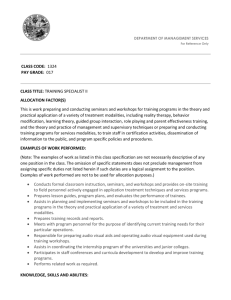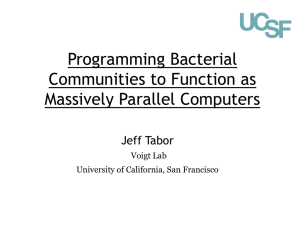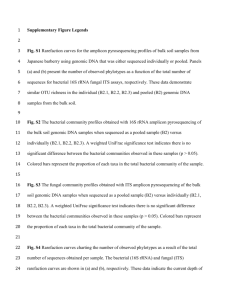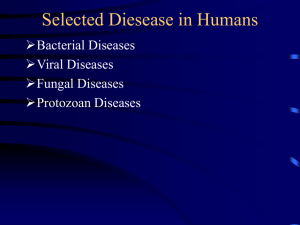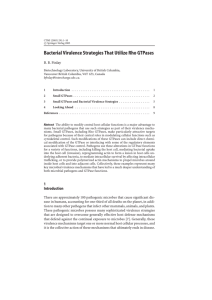Biosciences - University of Kent
advertisement
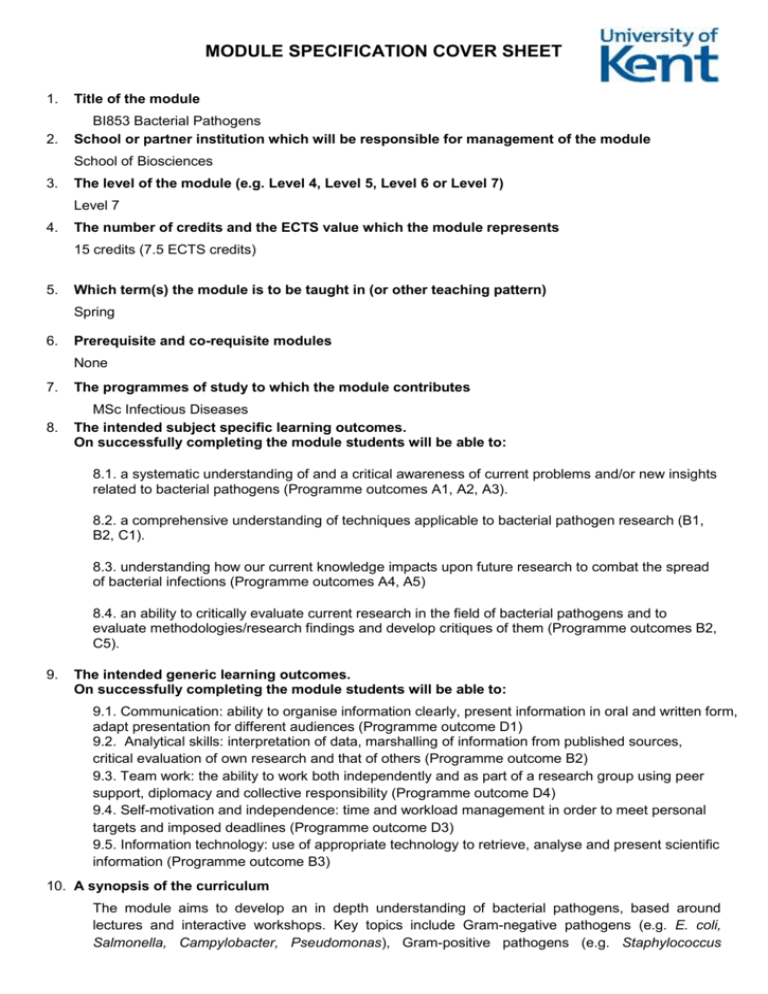
MODULE SPECIFICATION COVER SHEET 1. Title of the module 2. BI853 Bacterial Pathogens School or partner institution which will be responsible for management of the module School of Biosciences 3. The level of the module (e.g. Level 4, Level 5, Level 6 or Level 7) Level 7 4. The number of credits and the ECTS value which the module represents 15 credits (7.5 ECTS credits) 5. Which term(s) the module is to be taught in (or other teaching pattern) Spring 6. Prerequisite and co-requisite modules None 7. The programmes of study to which the module contributes 8. MSc Infectious Diseases The intended subject specific learning outcomes. On successfully completing the module students will be able to: 8.1. a systematic understanding of and a critical awareness of current problems and/or new insights related to bacterial pathogens (Programme outcomes A1, A2, A3). 8.2. a comprehensive understanding of techniques applicable to bacterial pathogen research (B1, B2, C1). 8.3. understanding how our current knowledge impacts upon future research to combat the spread of bacterial infections (Programme outcomes A4, A5) 8.4. an ability to critically evaluate current research in the field of bacterial pathogens and to evaluate methodologies/research findings and develop critiques of them (Programme outcomes B2, C5). 9. The intended generic learning outcomes. On successfully completing the module students will be able to: 9.1. Communication: ability to organise information clearly, present information in oral and written form, adapt presentation for different audiences (Programme outcome D1) 9.2. Analytical skills: interpretation of data, marshalling of information from published sources, critical evaluation of own research and that of others (Programme outcome B2) 9.3. Team work: the ability to work both independently and as part of a research group using peer support, diplomacy and collective responsibility (Programme outcome D4) 9.4. Self-motivation and independence: time and workload management in order to meet personal targets and imposed deadlines (Programme outcome D3) 9.5. Information technology: use of appropriate technology to retrieve, analyse and present scientific information (Programme outcome B3) 10. A synopsis of the curriculum The module aims to develop an in depth understanding of bacterial pathogens, based around lectures and interactive workshops. Key topics include Gram-negative pathogens (e.g. E. coli, Salmonella, Campylobacter, Pseudomonas), Gram-positive pathogens (e.g. Staphylococcus MODULE SPECIFICATION aureus, Bacillus anthracis, Mycobacterium tuberculosis), current and emerging virulence traits (e.g. adhesion, invasiveness, enhanced spread, toxin production, antimicrobial drug resistance). The module will involve a rotation of seminars covering key theoretical concepts, mechanistic insights into host:pathogen interactions, and discussion of practical approaches to combat the spread of bacterial infections. These will be accompanied by interactive workshops wherein students will analyse, present and discuss the relevant research literature. In addition, a computer workshop will provide bioinformatics training for the analysis of genomic traits pertaining to bacterial virulence. The students will gain experience in scientific design, literature analysis, scientific communication and the analysis and interpretation of complex experimental data. 11. Reading List (Indicative list, current at time of publication. Reading lists will be published annually) The reading list will be research articles, which will be used to drive a case-study based approach to learning. Students will be provided with their own copies of this reading material, but in some cases they will be set tasks for receiving appropriate journal articles to which we already have access. 12. Learning and Teaching methods Subject specific knowledge will be delivered in seminars supported by reference to the recommended scientific literature. Problem solving skills will be developed in discussion sessions and computer workshops and will be based on the understanding and interpretation of both experimental data and genomic information in computer workshops. (Module learning outcomes 11.1, 11.2, 11.3, 11.4) Generic skills will be developed in discussion sessions, presentations, computer workshops, outside reading and exam preparation (Module learning outcomes 12.1, 12.2, 12.3, 12.4, 12.5). Contact hours 28: Seminars/discussion sessions (8x3h). Journal club presentations (1 h). Computer workshop: (3h). Self-study (122): Preparation for seminars/workshops (50 hours), Computer workshop (12 hours) Presentation (15 hours) Revision and exam preparation (45 hours) 13. Assessment methods Oral presentation (journal club-style presentation) 30%. Computer workshop. Group and individual work to investigate the genetic basis of bacterial virulence: 30%. Examination (2 x 1h essays): 40%. 14. Map of Module Learning Outcomes (sections 8 & 9) to Learning and Teaching Methods (section12) and methods of Assessment (section 13) Module learning outcome Learning/ teaching method 8.1 8.2 Hours 2 Module Specification Template (September 2015) 8.3 8.4 9.1 9.2 9.3 9.4 9.5 MODULE SPECIFICATION allocated Private Study 122 X X X X X Seminars/discussion sessions 24 X X X X X Journal club presentations 1 X X X X X Computer workshop 3 X X X X X X X X X X X Assessment method X Journal club presentations X X X X X Computer workshop X Examination X X X X X X X X X X X 15. The School recognises and has embedded the expectations of current disability equality legislation, and supports students with a declared disability or special educational need in its teaching. Within this module we will make reasonable adjustments wherever necessary, including additional or substitute materials, teaching modes or assessment methods for students who have declared and discussed their learning support needs. Arrangements for students with declared disabilities will be made on an individual basis, in consultation with the University’s disability/dyslexia student support service, and specialist support will be provided where needed. 16. Campus(es) or Centre(s) where module will be delivered: Canterbury If the module is part of a programme in a Partner College or Validated Institution, please complete sections 17 and 18. If the module is not part of a programme in a Partner College or Validated Institution these sections can be deleted. FACULTIES SUPPORT OFFICE USE ONLY Revision record – all revisions must be recorded in the grid and full details of the change retained in the appropriate committee records. Date approved Major/minor revision Start date of the delivery of revised version Section revised 14.12.2015 Minor Jan 2016 1, 10, 13 3 Module Specification Template (September 2015) Impacts PLOs( Q6&7 cover sheet)
